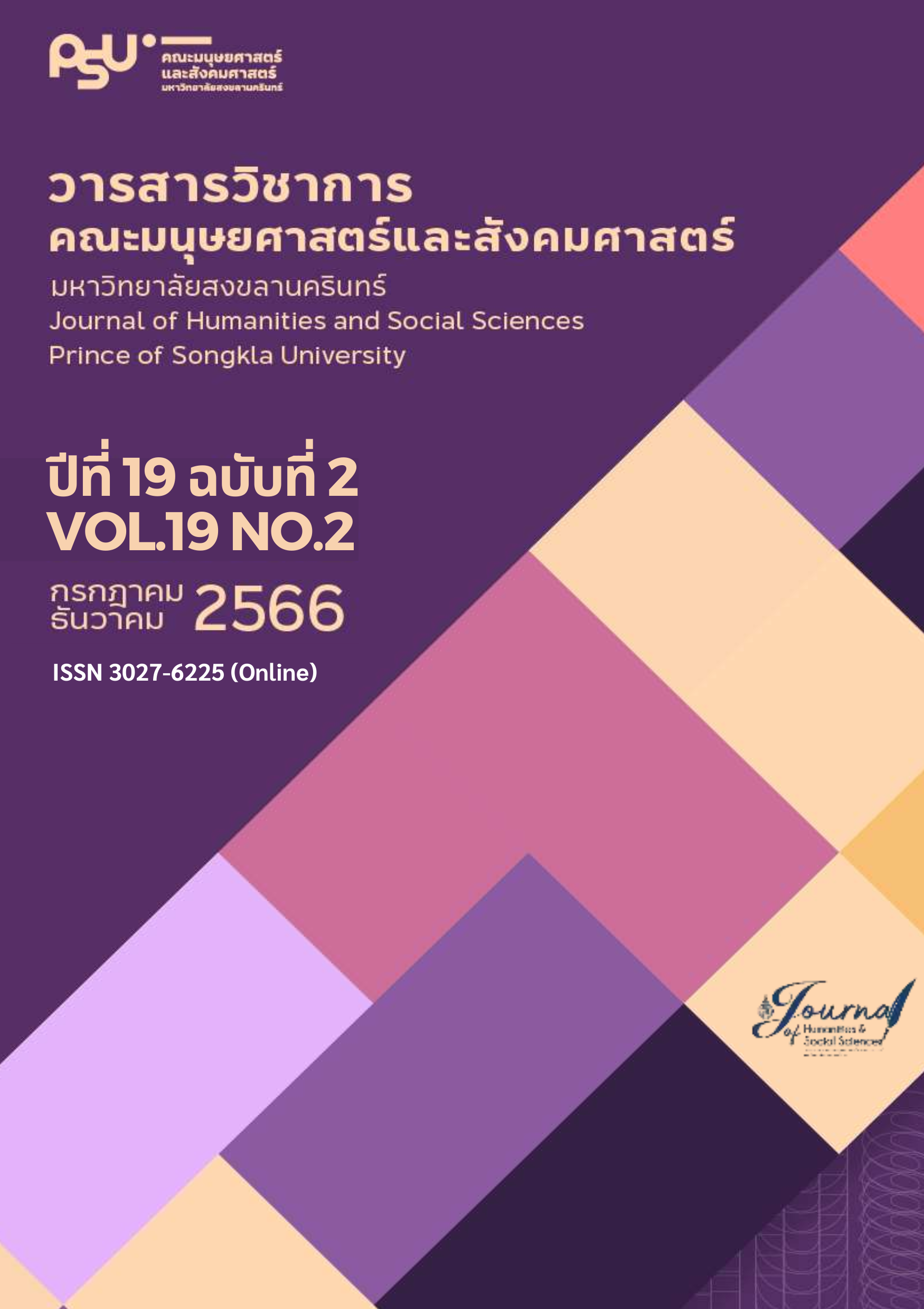Soft Power : The factors of the Republic of Korea’s development
Keywords:
Factor, Soft Power, Development, Republic of KoreaAbstract
This research aims to investigate the determinants that influenced the Republic of Korea's adoption of a soft power policy as a crucial strategy for national progress. In anticipation of challenges in economic development, the South Korean government incorporated the soft power approach as a fundamental component of the country's growth since the 1990s. This strategic shift empowered South Korea to transition from adversity to triumph, establishing itself as a global leader in cultural exports.
The study identified several factors motivating the South Korean government to implement soft power for economic development. The primary factor was the impact of the Asian Financial Crisis in 1997, prompting the government to utilize soft power to construct a new national image. The second factor encompassed geographical limitations and diplomatic considerations. The third factor involved leveraging soft power to globally promote products and consumption values. The fourth factor was the influence of successful entertainment industry models from the United States and Japan. Finally, population constraints constituted the fifth factor, compelling South Korea to adopt soft power as a developmental strategy.
The convergence of these factors led the South Korean government to embrace soft power as a comprehensive approach to national development, propelling the country from economic challenges to global success in cultural exports.
References
กันยารัตน์ จันทร์สว่าง และสุภาวดี พรหมบุตร. (2562). ทุนมนุษย์กับการเปลี่ยนแปลง: กระบวนทัศน์ใหม่ของการบริหารทรัพยากรมนุษย์. วารสารวิทยาการจัดการ, 6(2), 209-222.
กุลลดา เกษบุญชู มี้ด. (2556). กระบวนการเข้าสู่ความเป็นสากลของระบบทุนนิยมและลัทธินิยมใหม่. วารสารสังคมศาสตร์ คณะรัฐศาสตร์ จุฬาลงกรณ์มหาวิทยาลัย, 43(2), 7-43.
ฉัตรชนก พินิจวงษ์. (2561). นโยบายการสร้างชาติเกาหลีใต้ของประธานาธิบดีปักจุงฮี ค.ศ.1961-1979 [บทความวิจัยปริญญาบัณฑิต, มหาวิทยาลัยศิลปากร]. ระบบฐานข้อมูลบทความวิจัยนักศึกษาสาขาวิชาเอเชียศึกษา คณะอักษรศาสตร์ มหาวิทยาลัยศิลปากร. http://isas.arts.su.ac.th/?p=3794
ณัฏฐณิชชา ภูวสิริโรจน์. (2563). นโยบาย Cool Japan กับการส่งเสริมเศรษฐกิจประเทศญี่ปุ่น [สารนิพนธ์ปริญญาบัณฑิต, มหาวิทยาลัยศิลปากร]. ระบบฐานข้อมูลบทความวิจัยนักศึกษาสาขาวิชาเอเชียศึกษา คณะอักษรศาสตร์ มหาวิทยาลัยศิลปากร. http://isas.arts.su.ac.th/?p=5242
นภดล ชาติประเสริฐ (บรรณาธิการ), ชนินทร์ มีโภคี, พัฒน์นรี ศรีศุภโอฬาร, พิพาดา ยังเจริญ, วิเชียร อินทะสี, จักรกริช สังขมณี, วิลาสินี พนานครทรัพย์, และ ไพบูลย์ ปีตะเสน. (2560). เกาหลี ปัจจุบัน Korea Today. ปทุมธานี : ศูนย์เกาหลีศึกษา สถาบันเอเชียศึกษาฯ มหาวิทยาลัยธรรมศาสตร์.
แบ๊งค์ งามอรุณโชติ. (30 มิถุนายน 2564). ปลุกเสือหลับ ขยับเสือนอนกิน: บทบาทของแรงงานเกาหลีใต้ กับการปรับโครงสร้างเศรษฐกิจให้ก้าวหน้า. The101. https://www.the101.world/awaking-sleeping-partner/
ไพบูลย์ ปีตะเสน. (2555). ประวัติศาสตร์เกาหลี : จากยุคเผ่าพันธุ์ถึงยุคสาธารณรัฐใหม่ (พิมพ์ครั้งที่ 2). กรุงเทพฯ: โพสต์.
วริศรา ภาคมาลี. (2563). การทูตสาธารณะ เครื่องมือ Soft Power ของเกาหลีใต้ กรณีศึกษาการทูตวัฒนธรรม [วิทยานิพนธ์ปริญญามหาบัณฑิต, มหาวิทยาลัยธรรมศาสตร์] หอสมุดแห่งมหาวิทยาลัยธรรมศาสตร์.
วันชัย ตัน. (15 กุมภาพันธ์ 2563). Parasite กับแผนยุทธศาสตร์ชาติเกาหลีใต้. กรุงเทพธุรกิจ. https://www.bangkokbiznews.com/social/1469
วิเชียร อินทะสี. (2551). ประสบการณ์การพัฒนาของเกาหลีใต้. วารสารเอเชียตะวันออกศึกษา, 13(1), 57-82.
_______. (2561). เกาหลีในช่วงอลหม่าน ค.ศ. 1864-1953. สำนักพิมพ์มหาวิทยาลัยนเรศวร.
วีระยุทธ กาญจน์ชูฉัตร และ Chang, H. (2560). กับดักสถาบัน: กลไกทางสถาบันกับการไล่กวดทางเศรษฐกิจ. Innovating Thailand. [Symposium]. สถาบันวิจัยเศรษฐกิจป๋วย อึ๊งภากรณ์ งานสัมมนาวิชาการธนาคารแห่งประเทศไทยประจำปี 2560, Centara Grand at Central World. https://www.pier.or.th/conferences/2017/symposium/
เอกศาสตร์ สรรพช่าง. (5 เมษายน 2564). เศรษฐศาสตร์ว่าด้วยการเต้นกินรำกินแบบเกาหลีใต้. The101. https://www.the101.world/entertainment-industry-and development-in-south-korea/https://digital.library.tu.ac.th/tu_dc/frontend/Info/item/dc:190150
เอนก เพิ่มวงศ์เสนีย์. (2543). ภาวะผู้นำกับการแก้ไขปัญหาวิกฤติเศรษฐกิจของเกาหลีใต้. วารสารสังคมศาสตร์ คณะรัฐศาสตร์ จุฬาลงกรณ์มหาวิทยาลัย, 31(1), 87-108.
ฮง, ยู. (2564). กำเนิดกระแสเกาหลี The Birth of Korean Cool (พิมพ์ครั้งที่ 2) (วิลาส วศินสังวร, ผู้แปล). เอิร์นเนส พับลิชชิ่ง.
BBC. (10 กุมภาพันธ์ 2020). ออสการ์ 2020 : Parasite กวาด 4 รางวัลใหญ่ รวมทั้งภาพยนตร์ยอดเยี่ยม. https://www.bbc.com/thai/international-51440199
Keohane, R. O. & Nye, J. S., Jr. (2000). Globalization: What’s New? What’s Not? (And So What?). Foreign Policy, (118), 104-119. https://doi.org/10.2307/1149673
Nye, J. S., Jr. (2004). Soft Power: the means to success in world politics. PublicAffairs.
North, D. C. (1991). “Institutions”. Journal of Economic Perspectives, 5(1), 97-112. https://doi.org/10.1257/jep.5.1.97
Schumpeter, J. A. (1950). Capitalism, socialism, and democracy. Harper.
Downloads
Published
How to Cite
Issue
Section
License
Copyright (c) 2023 Journal of Humanities and Social Sciences Prince of Songkla University

This work is licensed under a Creative Commons Attribution-NonCommercial-NoDerivatives 4.0 International License.
บทความนี้ได้รับการตีพิมพ์เป็นของวารสารวิชาการคณะมนุษยศาสตร์และสังคมศาสตร์ คณะมนุษยศาสตร์และสังคมศาสตร์ มหาวิทยาลัยสงขลานครินทร์ วิทยาเขตปัตตานี






